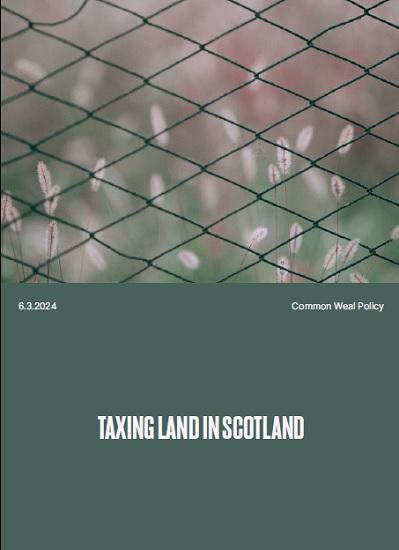Taxing Land In Scotland And Replacing Council Tax
19th April 2024

A proposal for a Local Authority controlled Land Tax with projected revenue for each Local Authority in Scotland.
Land is possibly the greatest immovable asset and store of wealth in Scotland that is not currently taxed. One tax that could apply to it, Inheritance Tax, is a reserved tax in Scotland, is easily avoidable and - obviously - results in tax revenue only at the point of inheritance rather than annually.
Scotland's other major wealth tax, the Council Tax, is regressive, badly outdated and taxes only dwellings and not land itself. However land and dwellings are fundamentally similar classes of asset. There is little reason why Council Tax should cover your home and your garden, but should cover a manor house but not its broader estate.
However, discussions about land taxation in Scotland have often stalled over the details of how to calculate the value of land so as to set an effective tax rate - especially in a climate where the value of land as a speculative asset often outstrips its value in terms of economic or environmental contribution.
This paper builds out from Common Weal's 2021 proposal to reform Council Tax with a Property Tax on dwellings set at a percentage of the market rate of that home and applies that same principle to the ownership of land. For the first time, a proposal for a Scottish land tax estimates not just the potential revenue for Scotland as a whole but combines real estate data with data on the economic potential of land to estimate the revenue that each of Scotland's Local Authorities could bring in and finds that in many cases, the combination of reform of Council Tax and the extension of the resulting Property Tax to land would substantially or completely close currently projected Local Authority budget shortfalls.
Key Points
― Land in Scotland remains the largest store of untaxed wealth in the country. This has negative effects not just on national and local budgets, but is corrosive to social equality, democratic accountability and on local economic and community development.
― The devolution framework restricts the Scottish Government from instituting a national-scale land tax but explicitly allows them to enable Local Authorities to manage their own land tax so long as the revenue is used to fund local services.
― Many proposals have been put forward on taxing land, from a bespoke Land Value Tax to various forms of Annual Ground Rent. Most have significant disadvantages such as issues with estimating the taxable potential of the land.
― Common Weal has found that a separate land tax may not be required. Council Tax should be replaced by a proportional Property Tax. This Property Tax should be extended to cover land as well as domestic buildings.
― Previous work by Common Weal found that a Property Tax on buildings set at 0.63% would be ‘revenue neutral' compared to Council Tax in 2019 - and would attract up to £650 million extra in 2023 given house price rises in the intervening time.
― Extending this 0.63% rate to land would raise an additional amount of around £450 million based on 2022 land prices.
― The distribution of this tax revenue on land has been estimated for each of Scotland's 32 Local Authorities. For example, Highland Council could expect to receive almost £97 million per year which is almost double their current projected budget shortfall.
― Set at the proposed rates, five Local Authorities would receive revenue from this tax on land equal to or greater than 50% of their current Council Tax revenue.
― More urban Councils benefit less from a Property Tax on land but this is compensated for by their greater expected revenue from Property Tax on buildings. Given that Council Tax is currently one of only a few taxes (semi-)autonomously controlled by Local Authorities, applying a locally controlled tax to land will give a greater degree of democratic control and accountability to those Local Authorities.
― The Scottish Government should act with urgency to replace Council Tax with a proportional Property Tax and should simultaneously extend it to land ownership as laid out in this paper.
Author
Craig Dalzell is Head of Policy at Common Weal
Read The full report from the Common Weal HERE
Pdf 24 Pages.
